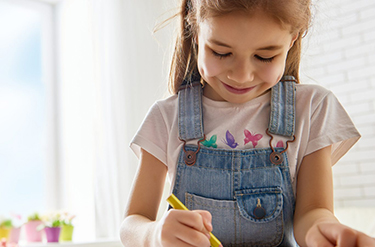The early years of a child’s life are the most crucial. It is the period when their brain develops exponentially as they begin to explore their surroundings and expand their cognitive ability. They form their earliest memories in these years. This is also the time when they are constantly picking up stimuli from their immediate environment and manipulating it in meaningful ways. Nudged in the right direction, the child has the potential to develop essential skills that will help them develop into rounded independent thinker and confident communicators.
Unfortunately, the traditional schooling system leaves a lot to be desired. It is based on an outdated philosophy of rote learning and competition, which is notoriously detrimental for the majority of children. However, the Montessori education method recognizes this special time in a child’s life, and is specially designed as student-centred pedagogy that lets the child learn through ‘hands on’ interactive activities and experiences, rather than traditional teacher-centred methods.
In this article, we explore how choosing ‘Montessori education’ for your child can benefit them by fanning their natural curiosity to foster a life long love of learning.
Child Focussed Education System
The Montessori system focuses on the child, instead of the teacher. What do we mean by that? Well in a school, there is a set syllabus, which has to be conducted in a finite amount of time. In other words, the pace of learning is set by the teacher. However such a method does not account for student differences. Someone who might be gifted in literacy may struggle with numeracy and vice-versa. For some, the problems may not be academic at all, but rather rooted much more sensitive areas, such as confidence and self-esteem. It is imperative to identify a child’s strengths and weaknesses early on giving them the best chance to address both to achieve their potential.
The Montessori system encourages children to explore their interests at their own pace. There is no segregation of children into classes or grades – each one is in a class of their own. This also encourages cross-level collaboration with peers. The pedagogy of the Montessori instead focuses on creating carefully constructed and guided activities for the kids to participate in. Each of them is designed to teach them something valuable.
The difference is that, the children are encouraged to take their own time to explore the lesson according to their level of developmental, not limiting their potential to their age. This ensures that once a lesson is learnt, it’s learnt for good.
Socialisation, Discipline and Self-confidence
The Montessori environment is an ideal ways to introduce your little ones to socialising with others for the first time prior to encountering a strict and rigid environment like school. School can be a stressful environment for many kids who find it difficult to make a place for themselves amongst so many peers at once. It also frequently leads to fights amongst classmates as children largely remain unsupervised in large groups outside their class-room and at recess.
An encouraging and collaborative environment created by Montessori, instils among children values of cooperation, teamwork and mutual respect. A study, reported by The Guardian Newspaper confirmed that Montessori students, when compared with traditional school kids, showed a greater measure of “justice and fairness” with each other and mingled in an “emotionally positive” manner leading to less “rough play” during recess.
Those of us who have had some less than pleasant days with our school bullies will surely appreciate this a little bit more. Most importantly, by ensuring that children take part in learning by completing activities themselves, Montessori education produces individuals who are confident, critical and creative thinkers.
Superior Hands on Learning
Simply stated hands on learning involves gaining knowledge and experience through actual participation in activities rather than only reading a book, listening to a lecture or by other audio-visual means. The name “hands on” learning automatically evokes notions of arts and crafts however, it can be creatively adapted to other theoretical subjects.
Some examples include, using physical aids to solve a maths problem together, explaining technical science concept through a fun experiment, Acting out a new story together to enhance literacy learning, recreating a historical sites and learning their significance, the list goes on.
Studies have repeatedly shown that hands on learning engages more parts of the brain, such as those parts which control fine motor co-ordination and activate self-regulation neural pathways. This leads to what is called “active learning”, which results in better understanding and conceptual clarity, automatically producing better academic results. It has also been observed by scholars that children can even learn technical subjects like science and maths even before being introduced to a formal schooling environment, if such concepts were introduced through hands on learning at an early age. The UNESCO International Bureau of Education (IBE) guide on “How Children Learn” also included ‘hands on learning’ as an important class room activity.
Montessori schools are champions of ‘hands on learning’ which is integrated into its core philosophy. Dr. Maria Montessori, the founder of the Montessori Method of Education considered hands on learning as not only superior but indispensable to education itself. A Montessori classroom is designed to provide as many interactive activities and aids for students for maximum engagement and retention of attention.
The Results are in, and Montessori wins
Critics of Montessori education often say that things like, the lack of emphasis on competition between peers, constant encouragement on learning at one’s own pace, and non-standardization of education, insidiously injects an attitude of laxness in students from Montessori. Compared to traditionally schooled students they argue, Montessori kids must perform worse academically. On the contrary, this myth has been busted for a long time now, repeatedly, by scholars of various institutes of international repute and independent research organisations alike.
One such study by the University of Virginia, has confirmed that the power of self-education and active learning in Montessori education is so positive, that even low income students in Montessori catch up to their higher income peers in a relatively short period of time. The study contrasted this with traditional schools where students coming from low income families continuously underperform over time.
Another study, confirms the equalising effect of Montessori. Out of 141 children, aged 3-6, 70 in Montessori and 71 in traditional schools, tested 4 times in 3 years, Montessori kids beat their school counterparts in all academic tests. They scored better both in reading and maths, and wrote “significantly more creative” essays. Most importantly, they scored much higher in “executive function” test, which the ability to react to changes and complex situations – an indicator for future life success.
If you are looking for an ideal Montessori for your child in Darra, Queensland, we at Little Wonders Montessori would love to hear from you. Our philosophy puts your child at the core and while focusing on a number of development areas such as etiquette, language, science and mathematics. All lessons are carefully constructed supervised and interactive indoor and outdoor activities with materials designed to provide your child with the correct sensorial experience for maximum attention and engagement.
And when the little ones get hungry from all the running around, our team of chefs are ready to treat their little tummies with daily nutritious home-made meals designed by our in-house expert dietitian.
Contact us here for a Free Tour.

